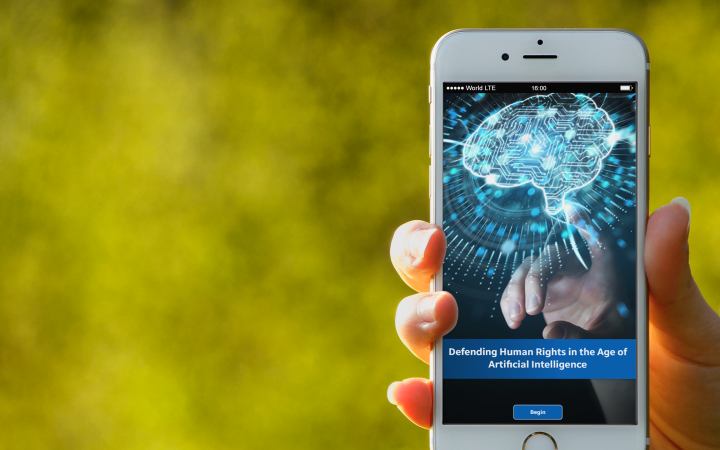3 September 2021, Hiroshima, Japan – From algorithms that are designed and used to shape the way our social media news feed is shown, to those profiling users and curating the information they receive, Artificial Intelligence (AI) is impacting human rights worldwide. There is an urgent need to inform and educate people on how their rights are affected by AI and empower them with tools to guard their rights.
UNESCO and UNITAR jointly launched a new microlearning course on AI and Human Rights for youths aged 16 to 24. The course breaks down complex concepts about AI through activities built around our daily technology interactions. The course focuses on how freedom of expression, right to privacy and the right to equality are impacted using AI.
On the launch of the course, the UN Secretary-General’s Envoy on Youth Jayathma Wickramanayake said that,
When it comes to creating a more inclusive world, young people are routinely leading the way. Developed and reviewed in collaboration with global youth networks, this AI and Human Rights course is an important contribution to these efforts in addressing and supporting the work of young people around the worlds.
Roshni Biswas, a software engineer and peer-reviewer for the course, added that “while recognizing the incredible advancements in the [AI] space, the course touches upon the gravity of the impacts of such technologies if left unchecked, especially on vulnerable individuals and groups and their human rights. The examples are coherent with the real world and depict why this ethics discussion is paramount to safeguard humanity.”
UNITAR ran a pilot version of the course “Leading Inclusive 4IR: Empowering Women in Afghanistan for the Future of Work through Digital Reskilling” in May 2021.
Artificial Intelligence is increasing its presence in our lives and it’s crucial we use human-rights based approaches to be more aware of its power and ethical risks. We are pleased to launch this new course and to enhance our partnership with UNESCO,
said UNITAR Division for Prosperity Director Mihoko Kumamoto.
Over 300 women successfully completed the pilot programme.
“I really liked the AI and human rights course. Having basic knowledge of ICT and digital technology is a must,” said one of the participants of the pilot programme.
UNESCO’s Assistant Director-General Tawfik Jelassi said that this “course is an example of the collaborative spirit across different UN agencies that are working together to develop solutions to translate high-level AI ethics and governance principles into tangible products for strengthening human capacities in dealing with the challenges of AI.”


